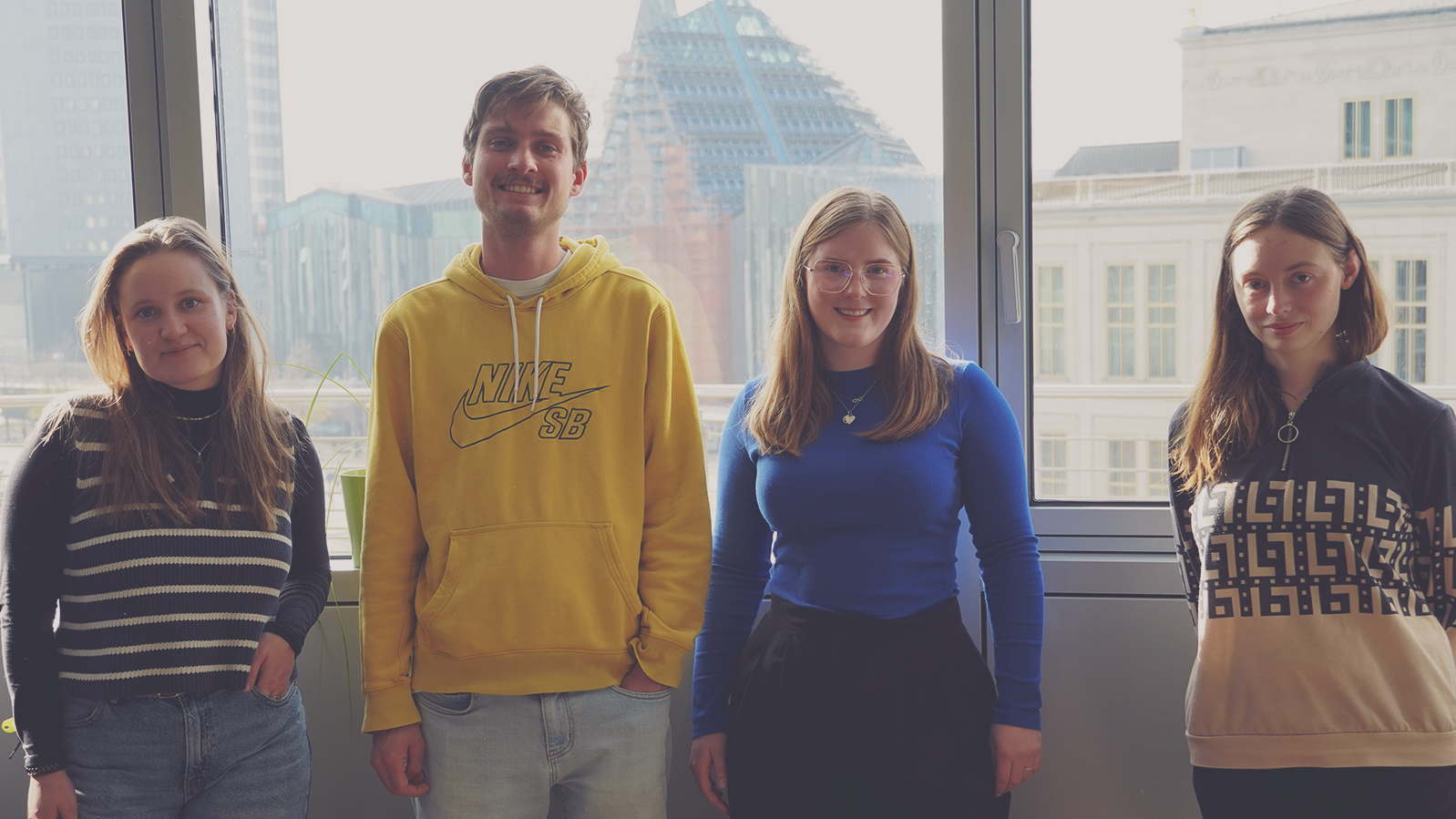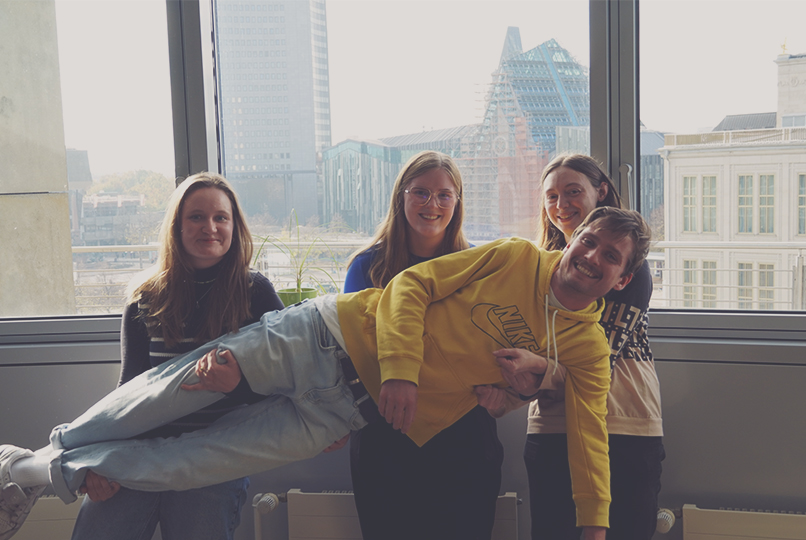
In the first part of our series, our working students Anton and Josi already gave exciting insights into their working days at IT Sonix. In next part, we introduce two more working students who demonstrate how varied the work here can be.
As working students, they are fully integrated into their teams from day one and benefit not only from practical experience but also from small perks that make every day work more pleasant. These include a fitness card for the nearby gym, delicious lunches twice a week, and regular company events that provide some variety.
In this part, Klara, one of our working students in Software Development, and Charlotte, a working student in the UXD team, report on their working days. They explain what tasks they take on, what projects they are driving forward, and what interesting experiences they have had in the process.
Hello, who are you, what are you studying and in which semester?
Klara: Hi, I’m Klara and I’m studying Media Informatics for my Master’s degree at HTWK Leipzig. I’m currently in the 5th semester and writing my thesis.
Charlotte: I’m Charlotte and I’m studying German Studies for my Bachelor’s degree. I’ve reached the 9th semester and am also currently writing my thesis.
What does a typical working day look like for you?
Klara: I work on Tuesdays and Thursdays from about 8 to 12. On those days, I usually arrive between 8 and 9 because that’s when our daily meeting takes place. Before the daily meeting, I usually read my emails and get a coffee. When that’s done, I work on a project where I develop software with Angular in the frontend. At the moment, I can focus exclusively on this project. As there is always lunch on Tuesdays and Thursdays, I often take advantage of that. Every other Tuesday, I work from 8 to 16, as that’s when we often have retrospectives or planning days, for example. Otherwise, I can say that, as a working student, I’m a team member like everyone else, and there are no differences except that I can’t attend all the meetings. My attendance at meetings is optional, to ensure that I can really work and make progress with my tasks.
Charlotte: When I go to the office, I usually arrive around 8:30 and first read emails and messages. Then we often have meetings where tasks are discussed and assigned. During the day, I work on writing text contributions for the website, our social media presence, and internal publications, in consultation with others. In between, I get coffee and take advantage of the free lunch twice a week. Occasionally, I also have to get creative to contribute to our team’s GIF culture.
Why did you choose IT Sonix as your employer and how did you hear about us?
Klara: To be honest, I kind of “slipped into it” because my Bachelor’s degree officially lasts 3.5 years, which left me with some time to bridge until my Master’s studies. I applied for a full-time position on my own initiative and later transitioned into a working student role during my Master’s. I’ve now been working at IT Sonix for 2.5 years.
Charlotte: To finance my studies, I’d already had several side jobs, but they often had nothing to do with what I ultimately want to do – which is writing. At IT Sonix, I have the opportunity to gain experience in SEO writing and gather insights into the professional world that really enhance my CV. The perks and the central location of the office in Leipzig gave me the final push to apply.
How does the company support you in combining your studies and your job?
Klara: IT Sonix supports me by not tying me to core working hours as a student but allowing me to work flexibly and in line with my studies. I’ve found that you can always talk to colleagues if, for example, it’s not possible to work. As long as I meet my hourly quota, everything regarding working hours is very flexible.
Charlotte: Firstly, I communicated from the start that I couldn’t manage the 20-hour workload alongside my BAföG payments and writing my Bachelor’s thesis, which is why I’m allowed to work fewer hours. Secondly, there’s the option to work flexible hours, so the working times are extremely adaptable, and I can change the days and distribution of hours after consultation.
What is the coolest thing about your job as a working student?
Klara: Honestly, coffee breaks with my team are always great. I also think it’s cool that I was welcomed into the team and can ask questions and join discussions just like everyone else. The straightforward communication with colleagues also plays a big role.
Charlotte: The coffee machine in the office is definitely a highlight for me! But also the lovely, bright office with my own desk, the very kind team I work with, and the flexible working hours are all things I wouldn’t want to miss.
Is there an interesting project you're currently working on?
Klara: At the moment, my Master’s thesis takes up a big part of my time. Otherwise, I’m working on a project where I’m learning Angular, which is very exciting.
Charlotte: Currently, I’m mainly focused on my Bachelor’s thesis. Besides that, we’re working on this series of articles about “Working Students at IT Sonix” to give young people insights from students about their experiences in working student positions here.
What are your favourite programming languages to work with?
Klara: I enjoy working with Angular the most. In my studies, it’s mainly C#, Unity, Python, and shaders.
How did you come across IT Sonix?
Klara: I actively looked for software companies in the area and checked where positions were available, and then I applied to IT Sonix.
Charlotte: I’d looked at some open positions on the job board at Leipzig University, including the one at IT Sonix. Some time later, I received an email from HR asking if I would like to apply, so I did.
To what extent does the practical experience you gain here help you in your studies?
Klara: It’s been very helpful to learn workflows related to working with Scrum and Kanban, which helped me work in a more structured way. That has helped me learn how to coordinate better with others. That’s been very interesting and has helped me bring more structure into my studies.
Charlotte: My work here obviously has little to do with literary and linguistic studies – what I do in the academic context at university. But since I want to focus on writing in my professional career, I’m gaining valuable experience in SEO writing, social media content creation, and I’m learning a bit about software development and agile work methods.
Do you already have ideas for your professional future and has your time as a working student here perhaps also had an influence on this?
Klara: I’d really like to be taken on full-time and work as a Frontend Developer. My time here as a working student has definitely had an impact, as I enjoy working with the people here and would love to continue doing so in the future. Feeling comfortable in the team plays a big part in this.
Charlotte: Working as an editor would be my dream, but the industry doesn’t exactly have a shortage of people. So, I’ll probably pursue a Master’s degree in editorial writing and then… we’ll see.
What experience did you already have here before the work-study programme? Have you been able to develop/advance this experience?
Klara: Before my working student role at IT Sonix, I worked as a waitress and at another company in the VR sector. Here, I’ve particularly learned how important work safety is, as there’s a strong emphasis on ensuring you don’t overwork, have recovery days, and can truly rest when you’re sick. I appreciate that a lot because it wasn’t the case at my previous company. In my opinion, everything works really well here, and there’s a lot of consideration for everyone.
Do you have any tips for other students who are thinking about applying for a position here?
Klara: Since the process took a bit longer for me, I recommend sticking with it and regularly asking about the current status during the application process. Once you’re in and hired, I’d advise getting to know everything and not being afraid to ask questions. Also, don’t feel like you’re “just” a student with no clue – that’s simply not true.
Charlotte: My tip would be not to fear the application process. I was extremely nervous and a bit intimidated by the big, professional office and thought I wouldn’t fit in here. In the end, everyone was super friendly and open, and I got way too stressed about it beforehand. No one wants to make it hard for you, and I had lots of patient answers to my many questions. Oh, and: find a working student already employed here and bombard them with questions!
